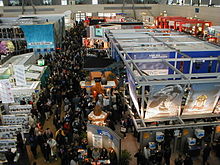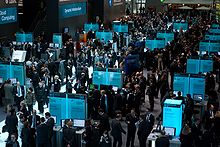CeBIT
You can help expand this article with text translated from the corresponding article in German. (January 2017) Click [show] for important translation instructions.
|
| CEBIT | |
|---|---|
Logo | |
| Status | Defunct |
| Genre | Computer Expo |
| Frequency | Annually |
| Venue | Hanover fairground |
| Location(s) | Hanover |
| Country | Germany |
| Inaugurated | 1970 |
| Most recent | 2018 |
| Attendance | 120,000 (2018)[1] |
| Organized by | Deutsche Messe AG |
| Website | www |





CeBIT was a computer expo which, at its peak[when?], was the largest and most internationally representative. The trade fair was held each year on the Hanover fairground, the world's largest fairground, in Hanover, Germany. In its day, it was considered a barometer of current trends and a measure of the state of the art in information technology. It was organized by Deutsche Messe AG.[2]
With an exhibition area of roughly 450,000 m2 (4.8 million sq ft) and a peak attendance of 850,000 visitors during the dot-com boom, it was larger both in area and attendance than its Asian counterpart COMPUTEX and its no-longer held American equivalent COMDEX. CeBIT is a German language acronym for Centrum für Büroautomation, Informationstechnologie und Telekommunikation,[3] which translates as "Center for Office Automation, Information Technology and Telecommunication".
The final CeBIT took place in 2018.
History
[edit]CeBIT was traditionally the computing part of the Hanover Fair, a big industry trade show held every year. It was established in 1970, with the opening of the Hanover fairground's new Hall 1, then the largest exhibition hall in the world.[4] However, in the 1980s the information technology and telecommunications part was straining the resources of the trade fair so much that it was given a separate trade show starting in 1986, which was held four weeks earlier than the main Hanover Fair.
The number of visitors for the new exhibition increased to 830,000 in 2001, but by 2007 the CeBIT expo attendance had shrunk to around 200,000,[5] then attendance rebounded to 334,000 by 2010.[6] The 2008 expo was marred by police raids of 51 exhibitors for patent infringement.[7] In 2009, the U.S. state of California became official Partner State of Germany's IT and telecommunications industry association, BITKOM, and of CeBIT 2009. focusing on environmentally-friendly technologies.[8]
From 2007 till 2013, the fair acted as the World Championship (Grand Final) of Intel Extreme Masters. The championship was reallocated to Katowice, Poland in 2014.[citation needed]
On 28 November 2018, Deutsche Messe AG announced that due to declining visitor and exhibitioner attendance, CeBIT would be canceled for the foreseeable future.[9][10] This makes CeBIT 2018 the final event.[11]
Other CeBIT-branded shows
[edit]As CeBIT continued to grow quickly and was becoming too big on its own, it was decided to concentrate on the professional market, while the home and entertainment market was given a separate show, CeBIT Home, during summer, planned to be biennial. However, after being held twice (in 1996 and 1998), the 2000 CeBIT Home (had originally been scheduled to be held in Leipzig due to the Expo 2000 being held in Hanover) was cancelled and the project was abandoned.
Since 1999 the CeBIT sponsor Deutsche Messe AG ("German Trade Show, Inc.") has organized trade shows outside of Germany bearing the CeBIT name:
- Internet +, powered by CeBIT (formerly CeBIT Asia), in Shanghai, China
- CeBIT Australia, in Sydney
- CeBIT Eurasia Bilişim, in Istanbul, Turkey
- CeBIT America/USA in New York City, United States.[12] It was held in 2003 and 2004, but subsequently cancelled in 2005.[13]
- CeBIT India, in Bangalore, India
- BITS Mexico, powered by CeBIT, in México City.
- CeBIT ASEAN Thailand, in Bangkok, Thailand.
CeBIT Global Conferences
[edit]Running over a five-day period in Hanover, Germany, the CeBIT Global Conferences (CGC) are staged congruently with the CeBIT exhibition. The conferences are dedicated to providing a 360° overview of the digital industry's four core markets: IT, Telecommunications, Digital Media and Consumer Electronics. Noted industry figures and researchers from across the globe are invited to speak on the latest relevant trends and innovations as well as their impact on society and the working world. The conference is divided up into keynote speeches, talks and panel discussions. The CGC conferences are produced by Deutsche Messe AG, with the German BITKOM association acting as the CGC patron since 2009. In 2014, the CGC were staged with 140 speakers on three stages with a program of 70 conference hours and 3000 participants. Target groups of the conference are CXOs, managers, experts, visionaries and out-of-the-box thinkers, Conference languages are English and German.[citation needed]
Recent conferences have featured the following keynote themes:
- 2008: "Improving Life in the Global Village". This installment of CGC attracted 1900 visitors and 43 speakers attending the keynotes and discussion sessions.
- 2009: "How Will We Be Working, Living and Communicating in the Coming Years?" This CGC drew 3,133 visitors from 88 nations, with some 2,200 guests following the conference via live streaming.
- 2010: "The Challenges of a Changing World – ICT for Better Lives and Better Business", attracting some 4,000 guests from more than 100 nations. Just under 4,000 guests also visited the conference via live streaming.[citation needed]
The motto of the CeBIT Global Conferences for 2011 was "The Power of Creativity and Innovation".
Speaker list 2014
[edit]- Steve Wozniak, co-founder Apple Computer
- Jimmy Wales, founder Wikipedia
- Eugene Kaspersky, CEO and Chairman, Kaspersky Lab
- Mark Shuttleworth, founder, Canonical
- Neelie Kroes, Vice President, European Commission
- Sir Nigel Shadbolt, Chairman and co-founder, Open Data Institute (ODI)
- Dean Douglas, CEO Unify
- Cristina Riesen, General Manager Europe, Evernote
- Mikko Hyppönen, Chief Research Officer, F-Secure
Over the past years, speakers at the CeBIT Global Conferences have included Gov. Arnold Schwarzenegger, Governor of California; Kevin Turner, COO, Microsoft, Craig Barrett, Chairman of the Board, Intel, Jon Iwata SVP Marketing & Communications, IBM, Reid Hoffman, Chairman and CEO, LinkedIn; Mukund Krishna, CEO Suyati Inc; Scott Durchslag, COO, Skype; Werner Vogels, Vice President & CTO, Amazon, Stewart Butterfield, Co-founder of Flickr.com, Michael T. Jones, Chief Technology Advocate, Google & Founder of Google Earth; Mark Kingdon, CEO, LindenLab.[citation needed]
CeBIT Awards
[edit]CeBIT was a platform for recognising achievement by ICT businesses, particularly in Australia.[14] The awards include the Excellence in Communications Award, the Advanced Retail Technology Award, the Innovative IT Security Award, and the Early Innovators Award. Notable past winners include Motorola,[15] McAfee[16] and eWAY.[17]
See also
[edit]- List of computer-related awards
- CES (Las Vegas, Nevada, US)
- COMPUTEX (Taipei, Taiwan)
- SIMO TCI (Madrid, Spain)
References
[edit]- ^ Heise Online: Positives Cebit-Fazit: Weniger, aber zufriedenere Messebesucher, accessed 2018-11-28
- ^ "CEBIT Events Worldwide". messe.de. Archived from the original on 2010-01-28.
- ^ "CeBIT – Daten und Fakten – Geschichte der CeBIT". Cebit.de. Archived from the original on 2011-11-01. Retrieved 2011-12-17.
- ^ 20 Jahre Centrum für "B" und "IT": Die CeBIT hat Geburtstag Archived 2008-01-06 at the Wayback Machine (in German) – By Detlef Borchers, heise online, 8 March 2006
- ^ Attendance for CeBIT increases to 200,000[dead link]
- ^ "Cebit 2010: Besucherzahlen leicht angestiegen". Golem.de. Retrieved 2011-12-17.
- ^ "Authorities seize gadgets during patent raid at German tech fair". International Herald Tribune. 2009-03-29. Archived from the original on 2009-02-10. Retrieved 2011-12-17.
- ^ "Schwarzenegger goes to Cebit". Theinquirer.net. Archived from the original on 2009-08-21. Retrieved 2011-12-17.
- ^ "Germany: CeBIT, world's largest IT conference, canned | DW | 28.11.2018". DW.COM.
- ^ Hans-Jürgen Tast Konfetti im Büro oder Die allerletzte CeBIT. Schellerten 2021. ISBN 978-3-88842-054-2
- ^ "Deutsche Messe restructures event portfolio – Trade fair news". Retrieved 2018-11-29.
- ^ "Techbrief – Cebit To New York". The New York Times. 2002-03-19. Retrieved 2011-12-17.
- ^ "CeBit America 2005 canceled – CNET News". News.cnet.com. Retrieved 2011-12-17.
- ^ "Australian companies fare well in CeBIT awards". Voiceanddata.com.au. 2007-05-21. Archived from the original on 2012-03-19. Retrieved 2011-12-17.
- ^ [1] Archived 15 November 2010 at the Wayback Machine
- ^ "CeBIT.AU Innovative IT Security Award 2010". Archived from the original on 2010-11-15. Retrieved 2011-02-02.
- ^ [2] Archived 26 January 2010 at the Wayback Machine
External links
[edit]- Cebit.de at the Wayback Machine (archived 27 January 2007)
- The history of CeBIT
